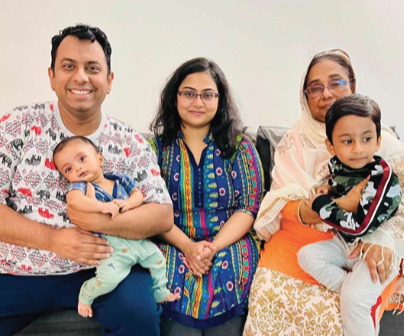In the dynamic world of pharmaceutical sciences and the ever-changing global regulatory space, professional journeys often are as winding as the landscape in which they’re situated. For Tanzir Mortuza, PhD (Pharmaceutical Sciences) ’18, who has worked at Merck, Takeda, and most recently Gilead Sciences, his journey has led him back home to the University of Georgia’s College of Pharmacy, where he now serves as the newest member of the College’s Alumni Board.
“After I graduated, I knew I eventually wanted to be involved in the College’s Development and Alumni Relations activities, because I only have good stories to share. From the mentors I met here… to the national and international opportunities that were provided to me when I was a student, I’ve always felt supported and rewarded by the College,” said Dr. Mortuza. “I am eager now to give back and help current students any way I can.”
As a member of the Alumni Board, Dr. Mortuza will support the group in their efforts to provide counsel, reach out to fellow alumni to encourage their participation, and support the College’s various initiatives, including fundraising.
Originally drawn to the College because of his interest in drug discovery, Dr. Mortuza sees industry as a promising career pathway for new pharmacy students. “Medications are a huge pillar in the healthcare system. You can have the best doctors and pharmacists in the world, but if you are trying to treat a disease that doesn’t have any medications for it, that expertise doesn’t go very far.”
Indeed, in his current role with Gilead as Senior Manager of Regulatory Affairs, Dr. Mortuza has seen firsthand the profound promise and reward in contributing to breakthrough medication development through a regulatory lens. “We’re responsible for an oncology product targeting triple-negative breast cancer. Just approved in 2020, TRODELVY is brand new, but already I’ve seen how appreciative patients are of the medication and of the work we do—it actually changes a lot of people’s lives for the better, and I feel blessed to be in a role where I get to serve humanity.”
In his daily work, Dr. Mortuza focuses specifically on the chemistry, manufacturing, and control regulations behind products such as TRODELVY, assuring that patients receive medications that are consistently safe and high quality. Fast-paced and high-impact, it’s a job that Dr. Mortuza says he wouldn’t have discovered if it weren’t for the mentorship he received at the College as a student.
“I was looking at different career options during my second or third year of my PhD,” Dr. Mortuza explained. “I saw job listings in regulatory affairs, and I started browsing the College’s related departmental website for International and Biomedical Regulatory Sciences. It was Dr. Michael Bartlett, Associate Dean for Science Education, Research, and Technology, who encouraged me to take relevant classes, leading to certificates that paved my path into regulatory affairs.” Dr. Bartlett, who says he’s “…not surprised that a former student as passionate and involved as Dr. Mortuza is now helping accelerate the College’s mission and evolving as a leader as a member of the Alumni Board…” was just one of many faculty members who shaped Dr. Mortuza’s journey. As a lead teaching assistant for Dr. Deborah Elder, Interim Assistant Department Head, Undergraduate and Professional Education, Dr. Mortuza received mentorship on teaching and the value of service. He would later embrace this skill set as a volunteer instructor for the College’s Dean Stuart Feldman Summer Science Institute alongside Drs. Elder and Vivia Hill-Scott, Director, Diversity Programs and Academic Support. “And, it was only with the support and open-door policies of professors, such as Dr. James V. Bruckner, Professor Emeritus, Dr. Cathy White, Associate Professor, and Dr. Phillip Greenspan, Associate Professor, that I was able to so readily get support throughout my PhD program,” he added.
As Dr. Mortuza reflects on what he hopes to bring to the College in his new role on the Alumni Board, he offers current students some advice: “It’s never too early to start networking! Your professional journey will be shaped by the relationships you build over multiple years, so it’s important to start building connections now. Don’t get lost in the ‘how’ of it all. You can just grab coffee with somebody at a conference or engage in small talk with a professor you think would be a good mentor.”
For Mortuza, it’s those small interactions compounded over multiple years and multiple interactions that made all the difference—and it’s those small interactions that he now looks forward to fostering among current students and colleagues alike.


